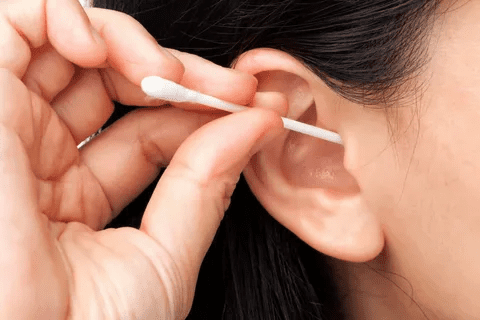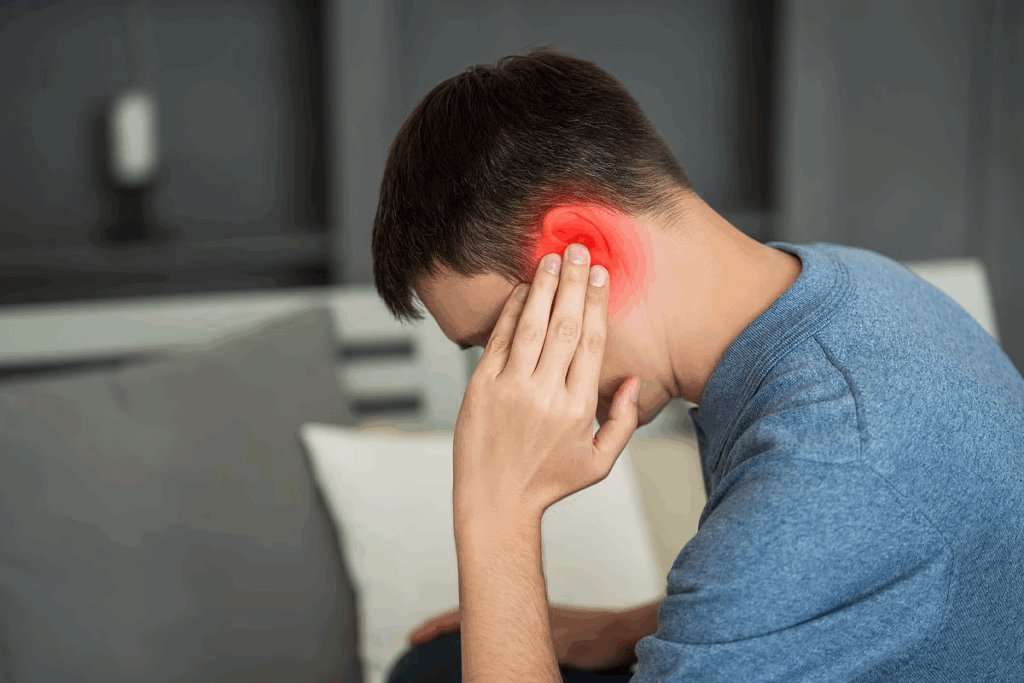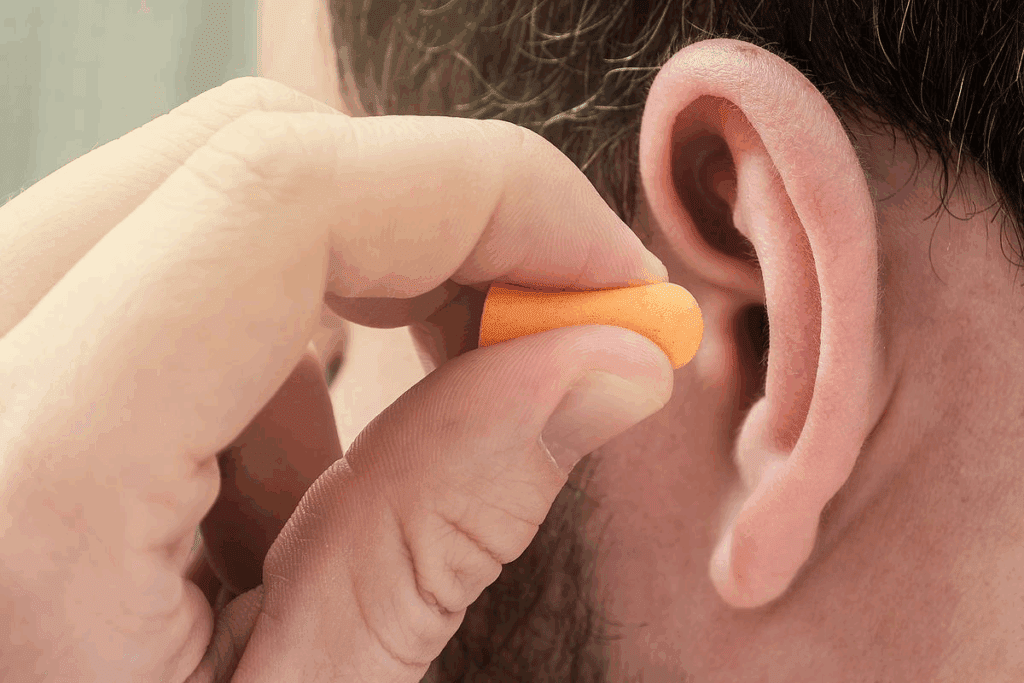Last Updated on November 27, 2025 by Ugurkan Demir

Feeling a burning sensation in your ears can be really uncomfortable. It can feel like a mild warmth or a sharp pain. At Liv Hospital, we know how important it is to find out why this happens. How to relieve a burning sensation in ear by addressing common causes like sunburn, skin irritation, or mild infection.
There are many reasons why you might feel this way. It could be due to an ear infection, something in the environment, allergies, or even a rare condition like Red Ear Syndrome. Knowing what’s causing it helps us figure out how to fix it.
We focus on you and your health at Liv Hospital. Our team is here to help you find and treat the source of your discomfort. We aim to give you the best care and information to help you feel better.

A burning sensation in the ears is a common issue. It can come from minor irritations or serious health problems. This feeling of warmth or heat inside the ear canal can be uncomfortable.
People with ear burning might also notice other symptoms. These can help figure out what’s causing the problem. Symptoms include:
These symptoms can be different in how bad they are and how long they last. Knowing what symptoms you have is key to finding the right treatment.
It’s important to tell the difference between acute and chronic ear burning. This affects how you should treat it.
Acute burning sensations are short-term. They can be caused by loud noises, sudden temperature changes, or minor infections. They usually go away with simple treatment once the cause is fixed.
Chronic burning sensations last longer and might mean a bigger problem. Causes can include long-term infections, allergies, or neurological issues. Treating chronic ear burning often needs a detailed plan, including medical help and changes in lifestyle.
Knowing if your ear burning is acute or chronic helps choose the best treatment. It also helps avoid more serious problems.

Ear burning can come from infections, allergies, or irritants. Knowing the cause is key to feeling better.
Ear infections often cause burning. Otitis externa, or swimmer’s ear, is an infection of the outer ear canal. It happens when bacteria or fungi grow in the ear’s moist area, often from water or bad ear cleaning.
Otitis media affects the middle ear. It might not directly cause burning but can lead to discomfort and pain.
“Ear infections are a frequent cause of ear pain and discomfort, and they can sometimes be accompanied by a burning sensation.”
Allergies to products or materials can also cause ear burning. For example, some people are allergic to metals in earrings, causing irritation and burning.
Other allergens, like hair care products or soaps, can also reach the ears and trigger an allergic reaction.
Environmental irritants can also cause ear burning. Cold weather can make ears feel burning or painful, if not protected.
Loud noises or chemicals can also irritate ears, causing a burning sensation. Protecting your ears from harsh environments is important to avoid discomfort.
Understanding these causes helps us find the right relief.
The feeling of burning ears inside can come from many things. While common causes like ear infections and allergies are known, other conditions also cause this discomfort.
Red Ear Syndrome is a rare condition. It makes the ear turn red and feel hot. It can also cause pain and swelling. The exact reason for RES is not known, but it might be linked to nerve problems or trigeminal neuralgia.
Certain neurological conditions can make your ears feel like they’re burning. Issues like neuropathy or nerve damage can cause odd feelings, like burning. If you think a neurological problem is causing your ear pain, see a doctor.
Autoimmune disorders can also make your ears feel hot. Conditions like lupus or rheumatoid arthritis can cause inflammation and pain in the ears.
“Autoimmune disorders can manifest in various ways, including causing a burning sensation in the ears. Proper diagnosis and treatment are critical to managing these conditions.”
Knowing about less common causes of ear burning is key to getting the right treatment. If you have persistent or severe ear burning, see a doctor. They can find out why and help you feel better.
The ears are very sensitive to temperature changes. This can make them feel like they’re burning. Things like extreme cold, heat, and sun can cause this.
Cold weather can make your ears feel like they’re burning. This happens because blood vessels in the ear get smaller. The body tries to save heat by cutting off blood flow to the ears.
Prevention is key: wearing hats or earmuffs can protect your ears from cold winds.
High temperatures can also make your ears feel hot. This is because blood flows more to the skin’s surface. This can cause inflammation and discomfort.
Staying cool in hot weather helps. Avoid direct sun and keep your ears shaded.
Sunburn can also make your ears feel hot. Ears are often exposed and may not get enough sunscreen.
“Protecting your ears from the sun is just as important as protecting your face and body,” says Medical Expert, an expert in dermatology. “Using a lip balm or ear-specific sunscreen with a high SPF can help prevent sunburn on the ears.”
Knowing how temperature affects your ears can help prevent burning. Taking steps to protect your ears can also help when you do feel discomfort.
Feeling a burning sensation in your ear? Finding out why is key to feeling better. We’ll show you how to figure out what’s causing it, from checking yourself to getting tests.
Start by asking yourself a few questions:
These questions can help you spot possible reasons for the burning.
Self-checking is good, but sometimes you need a doctor. You should see a doctor if:
If you’re not sure why your ears are burning or it’s bothering you, see a doctor.
A doctor might do tests to find out why your ears are burning. These could be:
| Diagnostic Test | Purpose |
| Otoscopy | To look at the ear canal and eardrum for signs of trouble |
| Tympanometry | To check how the eardrum moves and the middle ear’s health |
| Hearing Test | To see if you have any hearing loss |
| Imaging Tests (e.g., CT or MRI) | To find out if there are any structural problems |
These tests help doctors find out what’s causing the burning and suggest the right treatment.
When your ears start burning, it’s important to know how to stop the pain. Ears burning inside can be really uncomfortable. Luckily, there are ways to make it feel better.
One easy way to ease the pain is with a cold compress. Wrap an ice pack or a cold, damp cloth in a towel. Then, place it against your ear for 10-15 minutes. The cold helps reduce swelling and dulls the pain.
OTC pain relievers like ibuprofen or acetaminophen can help a lot. They not only ease the pain but also reduce swelling. This can make the discomfort go away.
Earwax buildup or debris can cause burning. Cleaning the outer ear with a washcloth might help. But, never put anything inside your ear canal to avoid hurting it more.
Drinking lots of water is key to healing and reducing swelling. Also, getting enough rest helps your body recover faster. Avoiding hard activities can also help.
Using these strategies can help you feel better when your ears burn. If the pain doesn’t go away or gets worse, see a doctor. They can give you the right treatment.
Doctors have many treatments for ear burning. The right treatment depends on why your ear is burning.
For infections or allergies, medicines can help a lot. These include:
Table: Common Prescription Medications for Ear Burning
| Medication Type | Condition Treated | Example |
| Antibiotics | Bacterial infections | Ciprofloxacin |
| Antifungals | Fungal infections | Clotrimazole |
| Corticosteroids | Inflammation | Prednisone |
Ear burning can also come from too much earwax. A doctor or ENT specialist can clean your ears safely. This can help a lot.
For conditions like Red Ear Syndrome or neurological issues, you might need special treatments. These can include:
It’s important to talk to a doctor to find the best treatment for you.
A burning sensation in the ear can be quite distressing. But, there are many natural and home remedies that can help. We will look at simple, non-invasive techniques that you can use every day.
Warm oil is a soothing remedy for ear discomfort. It moisturizes the ear canal and reduces inflammation. Here’s how to do it:
Certain herbs have natural anti-inflammatory properties. They can soothe an ear that feels hot inside. Some options include:
Always talk to a healthcare professional before trying new herbal remedies. This is important if you have sensitive skin or allergies.
Making dietary changes can help reduce inflammation in the body. This can help with a burning feeling inside the ear. Consider adding:
Eating a balanced diet with fruits, vegetables, and whole grains is good for ear health.
Gentle massage can improve blood circulation around the ears. This can help reduce a warm feeling in the ear. Here’s how to massage your ears:
This simple technique can help promote ear health and comfort.
While occasional ear discomfort might be harmless, some symptoms need quick action to avoid serious problems. It’s key to know the signs that mean you should go to the emergency room right away.
Severe symptoms that need quick help include intense pain, fever over 101.5°F (38.6°C), and discharge or bleeding from the ear. Also, if you have hearing loss, dizziness, or feel like your ear is full, get medical help fast.
Key indicators that necessitate emergency care:
Ignoring severe ear symptoms can cause serious problems. These include mastoiditis (an infection of the bone behind the ear), meningitis, or permanent hearing loss. Untreated ear infections can also spread to other parts of the head or brain, which can be very dangerous.
“Ear infections can lead to serious complications if not treated promptly. It’s vital to seek medical attention if symptoms persist or worsen.”
When you get to the emergency room, doctors will check you thoroughly. They will look at your medical history and examine your ear. They might do tests like tympanometry or imaging studies to find out what’s wrong.
Going to the emergency room can be scary, but getting help quickly is important. Be ready to tell them about your symptoms, medical history, and any medicines you’re taking.
Ear burning can be prevented with simple steps. We’ll look at these steps in this section. By following these tips, you can lower ear burning and keep your ears healthy.
Good ear hygiene is key to avoiding ear burning. Clean the outer ear with a washcloth gently. Don’t use cotton swabs in your ear canal, as they can push wax in and irritate it. Clean your ears during bathing or showering, letting water in and then tilting your head to drain it out.
Staying away from known irritants is also important. Be careful of allergies to hair dyes or earbuds, as they can cause allergic reactions and ear burning. Choose hypoallergenic products if you’re allergic to reduce the risk of an allergic reaction.
Extreme temperatures, loud noises, and sun can also cause ear burning. To protect yourself, wear hats or earmuffs in cold weather and use ear protection in loud places. Also, apply sunscreen to your ears when outside to prevent sunburn.
Regular health check-ups are essential for preventing ear burning. Ear examinations by a healthcare professional can catch issues early. This can greatly reduce the chance of ear burning.
By following these preventive steps, you can lower ear burning and keep your ears healthy. Remember, prevention is the best way to avoid discomfort and stay well.
Chronic ear burning is more than just a physical problem. It can also affect your mind, causing stress, anxiety, and a lower quality of life. It’s important to understand this to find ways to cope.
People with chronic ear burning often feel frustrated and helpless. It’s key to acknowledge these feelings and look for ways to feel better. Mindfulness meditation and deep breathing exercises can help manage stress.
Doing things that take your mind off the discomfort, like hobbies or spending time with family, can also help. It’s about finding a balance between facing the pain and not letting it control your life.
Reducing stress is vital when dealing with chronic ear burning. Activities like yoga and progressive muscle relaxation can lower stress levels. This might make the burning sensation feel less severe.
Connecting with others who face similar challenges can offer emotional support and advice. Support groups, online or in-person, provide a space to share and learn from others.
| Support Resource | Description | Benefits |
| Online Forums | Platforms where individuals can share their experiences and advice | Accessibility, anonymity, diverse perspectives |
| Support Groups | In-person or virtual meetings for sharing and support | Emotional support, practical advice, community building |
| Counseling Services | Professional help for managing the psychological impact | Personalized guidance, stress management, coping strategies |
By using these resources and techniques, people can better handle the mental effects of chronic ear burning. This can improve their overall well-being.
It’s important to know why ears might feel like they’re burning. We’ve looked at many reasons, like infections, allergies, and even the weather. These things can make our ears feel uncomfortable.
Finding out what’s causing the burning is the first step to feeling better. Sometimes, we can help ourselves with simple things like cold compresses or over-the-counter medicines. But, other times, we need to see a doctor.
If your ears keep burning or it’s really bad, you should see a doctor. They can figure out what’s wrong and help you feel better. Taking care of your ears can prevent more problems.
Knowing what might make your ears burn can help you avoid it. Keeping your ears clean and staying away from things that might irritate them is a good start. If you’re worried about your ears, don’t hesitate to get help from a professional.
Symptoms include a burning feeling in the ears, itching, and redness. You might also feel discomfort, pain, or a full feeling. Some people notice hearing loss too.
Several things can cause ear burning. This includes infections, allergies, and irritants from the environment. Temperature changes can also play a role.
Acute ear burning is short-term, often from an infection or incident. Chronic ear burning lasts longer and might be linked to ongoing health issues.
Yes, infections can cause ear burning. Both bacterial and viral infections can lead to inflammation and discomfort.
Try using a cold compress or over-the-counter pain relievers. Gentle ear cleaning and staying hydrated can also help.
Seek medical help for severe pain, fever, discharge, or hearing loss. If symptoms don’t get better or worsen, see a doctor.
Tests include ear exams, hearing tests, and imaging studies. Lab tests might also be used to find the cause.
Yes, warm oil treatments and herbal solutions can help. Dietary changes and gentle ear massage might also soothe the burning. Always check with a doctor before trying new remedies.
Keep your ears clean and avoid irritants. Protect yourself from environmental factors and get regular health check-ups to prevent ear burning.
Yes, it can cause stress and anxiety. These feelings can affect your overall well-being. Stress management and support can help cope with these effects.
Severe pain, fever, discharge, hearing loss, or dizziness are warning signs. If you have any of these, get emergency help.
Subscribe to our e-newsletter to stay informed about the latest innovations in the world of health and exclusive offers!